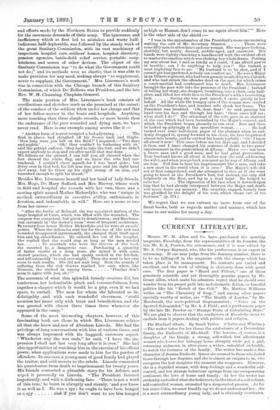The B/acklicfl Ghosts. By Sarah Tytler. (Chatto and Windus.) —The
writer takes for her theme the misfortunes of a Devonshire family, the Endicotts of Blackball. The heroine, of course, is a daughter of the family, a strong, self-willed, but affectionate woman who leaves her unhappy home abruptly while yet a girl, returning unknown in after-years a widow, enfeebled in health, to watch the fortunes of the family. The writer has made a fine character of Joanna Endicott. Queer she seemed to those who failed to see through her disguise, and she is almost an enigma to us, who recognise the lost daughter the moment she reappears. However, she is a dignified woman, with deep feelings and a wonderful self- control, and her strange behaviour springs from one overpowering sentiment, the love of home and family. In her the writer has evidently embodied what she believes to be the ideal of a self-reliant, self-controlled woman, animated by a deep-rooted passion. As for her sister Celia, we must frankly say we do not understand her ; she is a most extraordinary young lady, and is obviously overdrawn. A more nasty, cruel, and unnatural creature we have never met with in fiction, and we hope never again to see a similar mon- strosity. Lucy's silliness is probably exaggerated, though she is by far the most natural of the Endicotts. All these portraits require more shading ; they are too deeply lined, we might almost say, dug in. As a sketch faithfully accurate and true to life, time-serving Mrs. Reynolds is the best-proportioned of them all. There is, in- deed, little difficulty in recognising the vain, gossipy, and astute widow. The scene is laid on the moors, a fit background for the harsh and rugged beings whom the writer delineates. There is little of incident in the three volumes, which are chiefly one unvarying catalogue of the quarrels and bickerings of an ill-assorted family. For Jem we feel a sincere pity ; he is, if a despondent, yet a sterling and genuine man. He acts consistently throughout, even in the final scene, where all the characters collect together for a dramatic display, which, however, does not come off, the disclosure of Joanna's identity being put into the wrong mouth. The writer has an undoubted skill in making up most unpleasant people, and dissects her preparations with a steady and skilful hand. On the whole, The Blackhall Ghosts is decidedly unsatisfactory, though the writer shows, by many clever touches, her knowledge of the world, and especially her sympathy with country life.







































 Previous page
Previous page